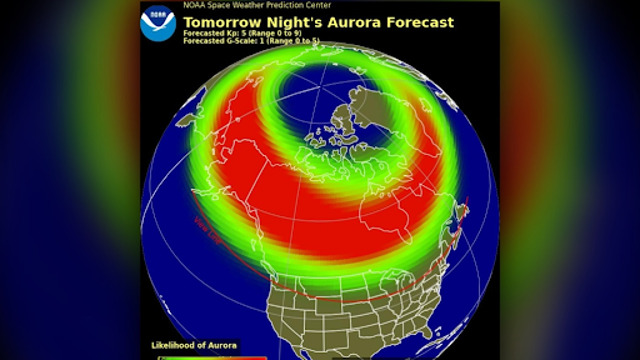
As of the afternoon of December 30, 2024, the National Oceanic and Atmospheric Administration has released its aurora forecast for December 31. CTV News
As Canadians prepare to welcome the new year, many may find themselves enjoying a dazzling light display across the sky, courtesy of the aurora borealis. While fireworks are a popular way to mark the occasion, this year, the Northern Lights could provide an even more spectacular show for people in many parts of the country.
The U.S. National Oceanic and Atmospheric Administration (NOAA) has released forecasts predicting a strong chance for the aurora borealis to be visible in Canada on New Year’s Eve. According to their predictions, this natural light show will shine brightly over much of the country, offering a rare opportunity to witness this stunning phenomenon.
However, the closer you are to the U.S. border, the less likely you are to see the Northern Lights. As the lights are expected to be most vivid in the northern parts of Canada, people living closer to the southern border might miss out on the full effect. But even if you're not in the best spot, there’s still a chance to catch a glimpse of this celestial wonder.
To see the Northern Lights at their best, it’s recommended to find a dark area away from the city lights, ideally in regions with minimal light pollution. The farther from city lights, the better the experience. But be warned—cloud cover might ruin the view. While some areas of Canada may get a clear sky, most of the country is expected to have overcast conditions this year on New Year’s Eve. However, parts of the Maritimes and British Columbia could offer better weather for viewing the lights, with fewer clouds to obstruct the display.
For those who are planning to catch a glimpse of the aurora, the optimal conditions will be key. The show’s visibility depends not only on weather conditions but also on the geomagnetic activity forecast for the evening. On December 31, NOAA has indicated a geomagnetic activity rating of five on their scale, which ranges from one (low activity) to nine (maximum activity). This rating suggests that a moderate geomagnetic storm will occur, bringing with it an impressive aurora borealis display.
The excitement doesn’t stop there. The aurora borealis is expected to continue shining into the early hours of January 1 and possibly even through January 2. According to the NOAA, the geomagnetic storm is expected to reach its peak early on Tuesday morning, with the aurora continuing to light up the night sky into the evening and possibly into Wednesday morning.
For those in northern Canada, the aurora borealis offers a chance to see a truly awe-inspiring natural light show that very few places in the world are lucky enough to experience. However, even in southern parts of the country, those with a keen eye and good weather might still get to enjoy the spectacle, as the northern lights can sometimes stretch further south than expected.
So, as you celebrate the arrival of the new year this December 31, keep your eyes on the sky. Whether you're in a remote part of the country or closer to the southern border, there's a good chance that the aurora borealis will light up the night, offering a stunning, unforgettable start to 2024.















